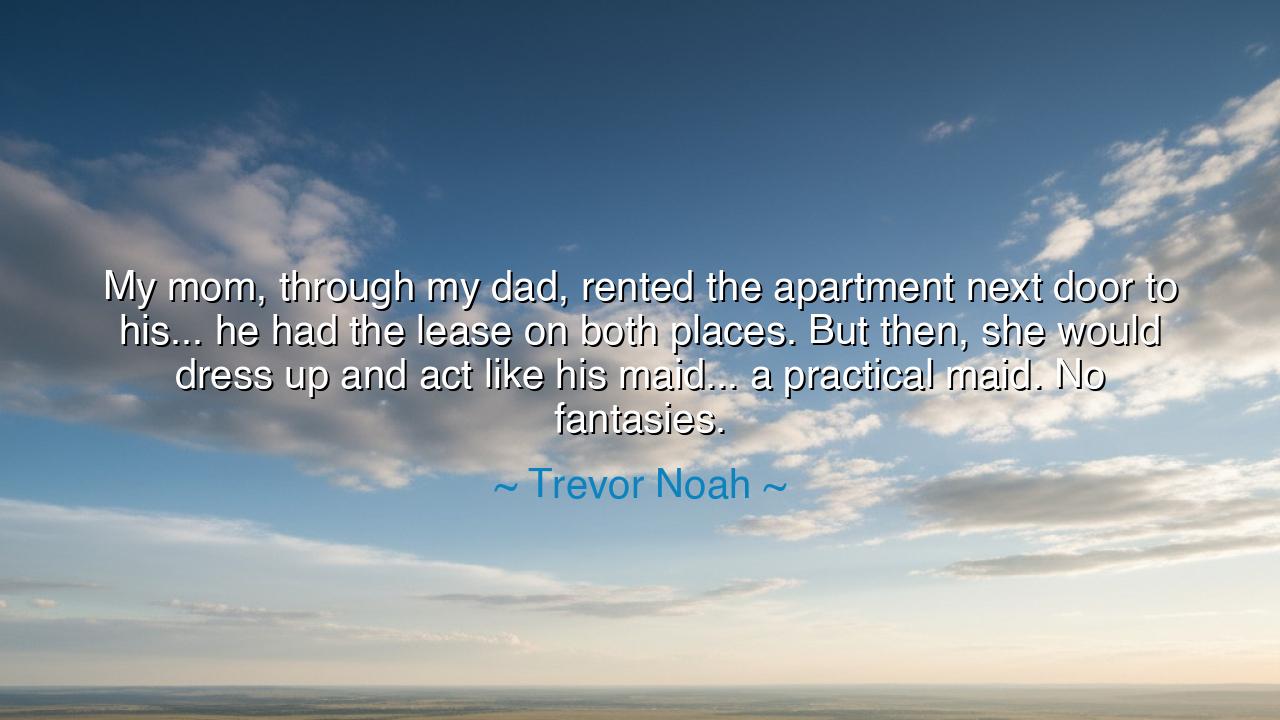
My mom, through my dad, rented the apartment next door to his...
My mom, through my dad, rented the apartment next door to his... he had the lease on both places. But then, she would dress up and act like his maid... a practical maid. No fantasies.






When Trevor Noah spoke the words, “My mom, through my dad, rented the apartment next door to his... he had the lease on both places. But then, she would dress up and act like his maid... a practical maid. No fantasies,” he was not telling a mere anecdote — he was revealing a truth born from the dark heart of history. His words, both humorous and heartbreaking, are a window into a time when love itself was a crime, and survival required wit sharper than steel. Beneath the laughter lies a story of resistance, courage, and the quiet genius of a mother’s love in the face of a world that sought to deny her very humanity.
The origin of this tale lies in the laws of apartheid South Africa — a system that sought to separate black from white, blood from blood, heart from heart. Under those cruel edicts, it was forbidden for a black woman and a white man to love, to marry, or even to share a home. Yet Trevor Noah’s mother, Patricia Nombuyiselo Noah, refused to let tyranny dictate the bounds of her spirit. She desired love, and she desired life on her own terms. So she wove her freedom from cunning and courage — renting an apartment under false pretense, disguising her affection as servitude, turning oppression itself into a mask through which she could live and love. Her deceit was not deceit of the heart, but of survival — a dance of defiance performed in silence.
In those days, every step she took was a rebellion. The law would have punished her love with imprisonment, or worse. Yet she persisted — not with weapons or protests, but with the audacity to exist where she was told she could not. That she called herself a “maid” was both shield and sword, allowing her to move unseen through the gaze of a system that sought to erase her. Noah’s telling of this story, years later, is laced with laughter — yet it is a laughter born of awe, the kind that honors the strength of those who endure. For behind the absurdity of disguise was a heroism as ancient as any battle fought with sword and shield.
The ancients themselves would have praised such cunning. Odysseus survived the wrath of gods not through brute force, but through cleverness — and so too did Patricia survive the wrath of man’s laws. Like Odysseus, she bent the rules of her world without breaking the spirit within her. Her story reminds us that in times of great injustice, wisdom and wit become the weapons of the oppressed. There are victories that are not sung by trumpets, but whispered behind closed doors, won by those who refuse to surrender their right to joy.
But Noah’s quote also reveals something deeper about love and identity. It shows how, even under oppression, love seeks a way to exist — sometimes hidden, sometimes disguised, but never extinguished. His mother’s act was not only one of defiance but of affirmation: that love, though forbidden, remains sacred. That dignity can wear any costume and yet remain pure. There is profound truth in this — that even in the darkest systems, the human heart remains free. No law, no government, no cruelty can conquer the simple act of a woman who decides to live in truth, even if she must hide it from the world.
When we reflect on this story, we see not only the pain of apartheid, but the timeless resilience of mothers — those who will risk everything to protect their children, their love, and their freedom. Patricia’s deception was not merely a means of survival; it was a declaration of hope for the child she would one day raise — a child who would grow to tell her story to the world. In her, we see that courage does not always shout; sometimes, it quietly cleans the floors of injustice while plotting its overthrow.
So, my child, take this lesson to heart: wherever injustice reigns, let cunning and courage walk hand in hand. When the world tells you that you cannot love, dream, or exist as you are, answer it not only with rebellion, but with creativity. Be as wise as Trevor Noah’s mother — who turned oppression into disguise, danger into daring, and survival into an art. For history remembers not only the warriors who fought in the open, but also the mothers who fought unseen, who disguised their love to keep it alive.
In the end, Patricia’s story — and Trevor’s retelling of it — reminds us that even when freedom must whisper, it whispers with the power of eternity. Love endures. Courage endures. And though injustice may demand masks, the truth beneath them shines unbroken, waiting for the day it can step into the light.






AAdministratorAdministrator
Welcome, honored guests. Please leave a comment, we will respond soon